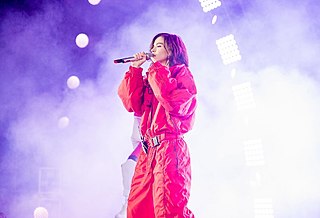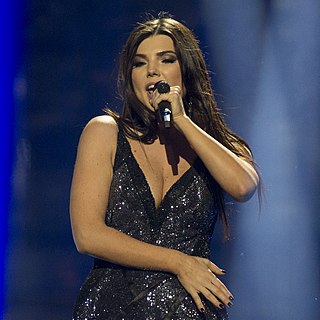
Romania has participated in the Eurovision Song Contest 22 times since its debut in 1994, and has placed in the top ten six times. Its best results were achieved by Luminița Anghel and Sistem in 2005, and by Paula Seling and Ovi in 2010, who both finished in third place. Selecția Națională, a song contest that has been taking place every year in Romania except for 2021, has been used to select the country's entry for the Eurovision Song Contest.
Mihai Trăistariu, also known as simply Mihai, is a Romanian singer and songwriter. He is best known for representing Romania at the Eurovision Song Contest 2006 held in Athens, Greece, where he placed 4th with his song, "Tornerò". The track gained commercial success, selling over one million units worldwide and influencing the trajectory of Trăistariu's career.

Serebro was a Russian girl group formed by their manager and producer Maxim Fadeev. Serebro was formed in 2007, consisting of Marina Lizorkina, Olga Seryabkina, and Elena Temnikova as a submitted proposal for consideration by Channel One Russia for the Eurovision Song Contest 2007. Serebro was selected to represent Russia at the 2007 Contest with the song titled "Song #1". They subsequently placed third at the contest, scoring a total of 207 points. Serebro was then officially signed to Fadeev's record label Monolit Records, and in 2012, the group had additional releases produced by Sony Music Entertainment and Ego Music. In 2009, Lizorkina announced her departure from the group; she was subsequently replaced by Anastasia Karpova. Karpova left the group in 2013 and was replaced by Dasha Shashina, who left in 2016. Temnikova left the group in 2014 due to health reasons, and Polina Favorskaya, who replaced Temnikova, left the group in 2017. Favorskaya was later replaced by Morgunova. In 2019, the line-up Olga Seryabkina, Katya Kischuk, and Tatiana Morgunova, the last one to include the last original member, has been replaced by Elizaveta Kornilova, Marianna Kochurova and Irina Titova.

"Don't Break My Heart" is a song recorded by Romanian singer Nicola for her greatest hits album Best of Nicola (2003) and fourth studio album De mă vei chema (2004). Written by Nicola and produced by her then-husband Mihai Alexandru, it was released as a CD single in 2003 by Cat Music. Musically, "Don't Break My Heart" is an uptempo dance recording.

Elena Vladimirovna Temnikova is a Russian singer, television personality and fashion designer. She came to prominence as a contestant in the talent show Star Factory and as one of the three members of the Russian girl group Serebro, which represented Russia in the Eurovision Song Contest 2007.

The Hearts of Soul, also known as Dream Express and LBS, were a Dutch-Belgian musical group that originally consisted of the Indonesian-born Dutch sisters Bianca, Patricia and Stella Maessen. Belgian singer and composer Luc Smets joined the group in 1975. The group is known for representing the Netherlands in the Eurovision Song Contest 1970 and Belgium in the Eurovision Song Contest 1977.

Paula Seling is a Romanian singer, songwriter, record producer, DJ, and television personality. Raised in Baia Mare, she attended Gheorghe Șincai National College and later moved to Bucharest to pursue a career in music.
Romania participated in the Eurovision Song Contest 2009 in Moscow, Russia. They selected their entry, "The Balkan Girls", by Romanian singer Elena through the national selection competition Selecția Națională 2009 organised by Romanian Television (TVR) in January 2009. Prior to the 2009 Eurovision Song Contest, Romania competed eleven times since its first entry in 1994. Its highest placing in the contest had been third place, which the nation achieved in 2005. In 2008, Romania finished in 20th place. "The Balkan Girls" attained local commercial success, topping the Romanian Top 100 in April.

"The Balkan Girls" is a song by Romanian singer Elena Gheorghe for a special 2009 edition of her second studio album, Te Ador (2008), and third record, Disco Romancing (2012). It was written by Laurențiu Duță and Alexandru Pelin, while production was handled by Duță, Ovidiu Bistriceanu and Daris Mangal. The song was released on an enhanced CD on 6 January 2009 by Cat Music. "The Balkan Girls" is a folk-influenced dance-pop song whose refrain celebrates the party life of Balkan girls.

Elena Gheorghe is a Romanian singer. In the first half of the 2000s, she joined the Romanian pop group Mandinga, with whom she released two albums. In 2006, she separated from the group and pursued her solo career. She has released three studio albums and one compilation album. She scored a top ten in the Romanian Top 100 with the debut single "Vocea Ta".

Vocea ta is the debut solo studio album by Romanian singer-songwriter Elena Gheorghe. Released in summer 2006, it is her first studio album since leaving the Latino pop band Mandinga, where she was the lead vocalist until 2005. The album is of pop, Latino-pop and dance music genre, being very similar to her two previous albums with Mandinga.

Tamar Mardirossian, known professionally as Tamar Kaprelian, is an Armenian-American singer, songwriter, and philanthropist. Kaprelian began her career in 2008, after winning a cover contest organized by OneRepublic, performing "Apologize". Following her win, Ryan Tedder introduced her to Interscope Records executives, and she was signed to the label. She went on to release her debut studio album Sinner or a Saint in 2010 through Interscope.

Susana Alimivna Jamaladinova, known professionally as Jamala, is a Ukrainian singer. She represented Ukraine and won the Eurovision Song Contest 2016 in Stockholm, Sweden, with her song "1944" about the Deportation of the Crimean Tatars. In 2017, 2018, 2019, 2022 and 2023 she served as a judge at Vidbir, the Ukrainian national selection for the Eurovision Song Contest.
Romania participated in the Eurovision Song Contest 2012 with the song "Zaleilah" written by Elena Ionescu, Costi Ioniță and Omar Secada. The song was performed by the band Mandinga. The Romanian broadcaster Televiziunea Română (TVR) organised the national final Selecția Națională 2012 in order to select the Romanian entry for the 2012 contest in Baku, Azerbaijan. Fifteen entries were selected to compete in the national final on 10 March 2012 where "Zaleilah" performed by Mandinga was selected as the winner after scoring top marks from a nine-member jury panel and a public televote.

"Zaleilah" is a song by Romanian band Mandinga for their fifth studio album, Club de Mandinga (2012). It was written by Costi Ioniță along with band lead singer Elena Ionescu and member Omar Secada. Produced by Ioniță and Dimitriu Silviu, it was released on 16 September 2011. Musically, "Zaleilah" has been described as Latin-influenced, with other inspirations including Balkan, Cuban, Gypsy and salsa music. A bilingual love song performed in English and Spanish language, its instrumentation consists of a bagpipe, marching drums, accordions and trumpets. Reviewers noticed similarities between "Zaleilah" and "Waka Waka " (2010) by Colombian singer Shakira and "Zou Bisou Bisou" (1964).

Mandinga is a Romanian pop group band from Bucharest. The original soloist of the band was Elena Gheorghe who left in 2005. From 2006 until 2016, the lead vocalist was Elena Ionescu. Ionescu left the band in March 2016 to pursue a solo career and was replaced by Spanish singer Barbara Isasi.

Pavel Parfeni, known professionally as Pasha Parfeny, is a Moldovan musician, singer and songwriter. He represented Moldova at the Eurovision Song Contest 2012 in Baku, Azerbaijan, where he placed 11th with his song "Lăutar". He was formerly known for being the lead singer of the Moldovan band SunStroke Project. He is set to represent Moldova again in the Eurovision Song Contest 2023 with the song "Soarele și luna".

Sanja Vučić is a Serbian singer and songwriter. Initially the lead vocalist of the Serbian crossover band ZAA, she represented Serbia at the Eurovision Song Contest 2016 with the song "Goodbye". From 2017 to 2022 she was a member of pop folk girl group Hurricane, during which time they represented Serbia in the Eurovision Song Contest 2021 with the song "Loco Loco". In addition, Vučić and Hurricane were scheduled to represent Serbia in the 2020 contest, which ended up being cancelled due to the COVID-19 pandemic.
Romania participated in the Eurovision Song Contest 2018 with the song "Goodbye" written by Alexandru Matei, Alin Neagoe and Cristina Caramarcu. The song was performed by the Humans. The Romanian broadcaster Televiziunea Română (TVR) organised the national final Selecția Națională 2018 in order to select the Romanian entry for the 2018 contest in Lisbon, Portugal. The national final consisted of six shows: five semi-finals and a final. A total of sixty entries were selected and twelve competed in each semi-final where a five-member jury panel selected three entries to advance to the final. The fifteen qualifiers competed in the final on 25 February 2018 where "Goodbye" performed by The Humans was selected as the winner entirely by a public vote.
Elena Tsagrinou is a Greek singer. Tsagrinou began her career as the lead singer of the Greek band OtherView, until beginning a solo career in 2018. She represented Cyprus in the Eurovision Song Contest 2021 with the song "El Diablo", finishing in 16th place.














